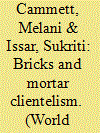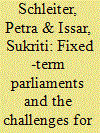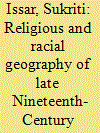| Srl | Item |
| 1 |
ID:
097900


|
|
|
|
|
| Publication |
2010.
|
| Summary/Abstract |
In plural societies, social welfare can be a terrain of political contestation, particularly when public welfare functions are underdeveloped and ethnic or religious groups provide basic social services. It is well established that such organizations favor in-group members, but under what conditions do they serve out-group communities? To address this question, the authors compare the welfare programs of the predominantly Sunni Muslim Future Movement and the Shia Muslim Hezbollah in Lebanon. Although they operate under the same institutional rules and economic contexts and boast the largest welfare programs in their respective communities, the Future Movement aims to serve a broader array of beneficiaries, including non-Sunnis, whereas Hezbollah focuses more exclusively on Shia communities. Based on analyses of an original data set of the spatial locations of welfare agencies, qualitative data from interviews with providers and beneficiaries, and case studies of areas where the two parties established and did not establish welfare agencies, the authors argue that distinct political mobilization strategies-whether electoral or nonelectoral-explain different patterns of service delivery across the two organizations.
|
|
|
|
|
|
|
|
|
|
|
|
|
|
|
|
| 2 |
ID:
133238


|
|
|
|
|
| Publication |
2014.
|
| Summary/Abstract |
The Fixed-term Parliaments Act significantly reduces the powers of the Prime Minister to manage the risk of government termination and to time elections to his or her party's advantage. In this paper we ask how the Act is likely to change the way in which governments terminate, their durability and opportunities for planning in government and departments. In answering these questions we draw on quantitative comparative evidence from other European countries that operate with fixed-term parliaments. Our analysis suggests that fixing the parliamentary term can be expected to convert some opportunistically called elections into regular elections and to stabilise governments toward the end of the parliamentary term. But the Act is also likely to have unanticipated consequences in increasing governments' vulnerability to failure before they reach the final sessions of Parliament. We explore these unanticipated consequences and outline their implications for governing style and Civil Service planning
|
|
|
|
|
|
|
|
|
|
|
|
|
|
|
|
| 3 |
ID:
185592


|
|
|
|
|
| Summary/Abstract |
The spatial separation of European colonialists and the local population was long seen as the defining feature of colonial cities. In recent years, the literature has moved toward a more ambivalent and contingent view of this spatial separation. This paper attempts to look beyond imagining the colonial city in terms of stark dualities or revisionist ambivalences, addressing both religious and racial separation. The paper analyses the street-level religious and racial geography of late nineteenth-century Bombay, using data from the 1881 Census. Results suggest moderate to high levels of racial and religious segregation in nineteenth-century Bombay at the street level, varying across groups, coupled with the existence of enclaves, and expressions of preference for segregation in diverse domains. The paper concludes that religion and race were meaningful social categories inscribed in urban space.
|
|
|
|
|
|
|
|
|
|
|
|
|
|
|
|